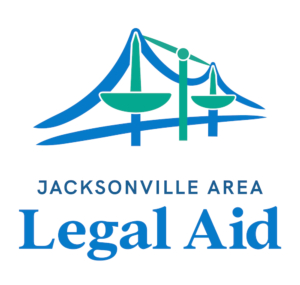
Logan McEwen, Marks Gray, P.A.
Stable housing is often the foundation for steady employment, educational achievement, good mental and physical health and economic autonomy. Now it in its second year, Jacksonville Area Legal Aid’s Eviction Defense Self Help Clinic focuses on ensuring stable housing to help families move out of poverty and towards financial health. This project is made possible for a second year through a Pro Bono Innovation Grant from the Florida Bar Foundation. Read more about the project later in this article, but first read about one of the many successful cases that came from this clinic. Longtime monthly Eviction Defense Clinic volunteer Logan McEwen describes one of the cases that he has accepted for full representation here:
What were the basic facts of your case?
An eviction was filed against a tenant for non-payment of rent, but she had paid rent consistently during the term of the lease. The tenant relied on public transportation; to ensure rent payment, each month the landlord drove to the property, picked up the tenant, drove her to an ATM where she withdrew the rent money, paid it to landlord, and then the tenant was dropped back off at the property. The landlord was trying to force the tenant out and misrepresented non-payment of rent in the eviction complaint a few days after having taken her money. The landlord also alleged breach of the lease due to the tenant having other adults on the property who were not listed on the lease. These other adults were the tenant’s babysitters for her children when she had to go to work. These babysitters were also present and witnessed when the landlord came to pick up the tenant to drive her to the ATM for rent payments.
What were you able to accomplish for your client?
After the eviction complaint was filed, it was evident that the tenant couldn’t reasonably expect to continue in the tenancy without future issues arising. I negotiated a dismissal of the eviction complaint with prejudice, early termination of the lease without penalty to the tenant, abatement of rent, and worked with the tenant to find a replacement property elsewhere.
Why was the outcome important to your client?
On principle, the tenant had done nothing wrong. She is a single mother, working and raising kids, who has enough difficulty in her life without a landlord fabricating fraudulent debt claims affecting the tenant’s credit and ability to obtain future housing. The economic impact of an eviction would have devastated the tenant and recovery would have been measured in months if not years. Ensuring that the client and her children’s lives were not thrown into disarray was important to her and we were able to do that.
Why was the experience important to you? That is, what did you gain from the experience?
The people the eviction clinic aims to help lack any voice or allies in these situations, and that is why they are targeted by unprincipled landlords and businesses. The number of clients who come through with similar stories is staggering. These aren’t isolated instances, they are pervasive. The bad actors count on the fact that tenants either don’t know their rights or can’t take on the economic burden of getting professional help. This client had done everything she was supposed to and still she faced a serious risk of being evicted to the streets with her children. The experience reminded me that these are the people in most need of our help.
What is the name of your firm? In what areas do you practice?
Marks Gray, P.A. Practice litigation and transactions in intellectual property, real estate, and business.
Why would you recommend other attorneys get involved in the Pro Se Eviction Defense project?
There are few things more disruptive and impactful than being forcibly kicked out of your home. As lawyers, we have the tools and the knowledge to generate enormous positive impact on these individuals’ lives by informing them of their rights and, if meritorious, helping them defend against wrongful evictions. Bettering the lives of people in our community is something we should all strive to do; as lawyers we have a unique opportunity to accomplish just that by showing up and making ourselves available.
The Eviction Defense Self Help Project is a resource available every Wednesday afternoon from 1:00-4:00 at Jacksonville Area Legal Aid, 126 West Adams Street. Tenants of private landlords who receive an eviction summons and who may have defenses, will go to the 7th floor to complete their answers using the Florida Justice Technology Center’s Pro Se Eviction Defense Answer form. Pro bono attorneys will be there to assist with the answer and to provide guidance. Tenants will be directed where and how to file their answers that day. The Eviction Defense Self Help Project needs a few good law firms and willing pro bono attorneys.
The law firm commitment:
The goal is to have four law firms commit to staffing the Project once a month. The law firm will supply 2-3 firm attorneys one Wednesday afternoon per month (1:00-4:00) to assist pro se tenants in private rental properties create answers to their eviction summons or rental conditions letters. Attorneys are encouraged to consider representing clients in either a full or limited capacity, especially those that may be harder hit by eviction: persons with disabilities, single parents, senior citizens.
Benefit to the law firm:
Through participation in the Project, new associates get excellent client interviewing, representation, and litigation experience with short-term matters. The participating firm attorneys will build a core of expertise and have the opportunity to collaborate on short term cases.
Support for pro bono attorneys:
Training webinars with CLE credit will be provided. In addition, Suzanne Garrow, the attorney who is the project coordinator, will be on site to assist as needed, and guide the process. This project has been piloted for the past two years by Smith Gambrell & Russell which will continue to participate on the second Wednesday of every month. The logos of all participating law firms will be included on project information.
Landlord/Tenant cases move quickly making it difficult to provide meaningful assistance to tenants facing eviction. Because the Eviction Defense Self Help Clinic will be offered weekly, qualifying tenants will have greater opportunity to file effective answers and defend against wrongful evictions.
Law firms and pro bono attorneys are encouraged to contact Missy Davenport, Chair, The JBA Pro Bono Committee for more information on the Eviction Defense Self Help Project and other opportunities for pro bono involvement throughout the Fourth Judicial Circuit and beyond at missy.davenport@jaxlegalaid.org.



